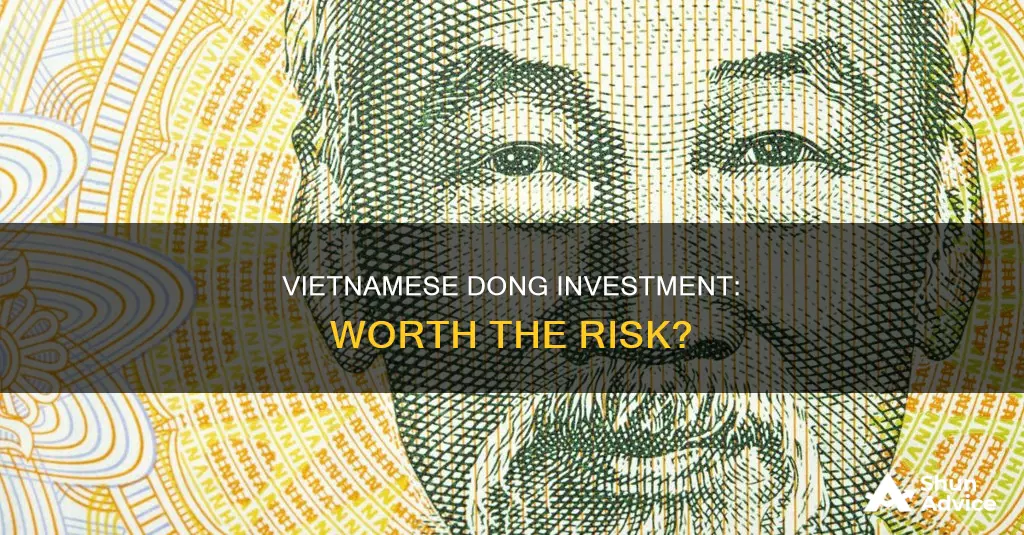
The Vietnamese Dong has been described as a scam currency, with investors warned against adding it to their portfolios. The currency is legitimate and tangible, but it is illiquid, thinly traded, and prone to scams. The Vietnamese government aims to keep the value of the Dong stable to encourage exports and foreign investment, but the currency has been devalued five times since 2014 to boost exports and ensure currency stability. The value of the Dong is influenced by Vietnam's trade flows, foreign currency reserves, economic growth, interest rates, inflation, and US monetary policy. In recent years, the Dong has depreciated heavily against the US Dollar, and it is predicted that the Dong will continue to weaken against the Dollar in the coming years.
What You'll Learn

Is the Vietnamese Dong a good investment?
The answer to this question depends on your personal circumstances, risk tolerance, and how much you intend to invest. It is important to do your own research and never invest money that you cannot afford to lose. With that said, here is some information to consider when thinking about investing in the Vietnamese Dong.
Factors Affecting the Value of the Vietnamese Dong
The value of the Vietnamese Dong is influenced by several factors, including Vietnam's trade flows, foreign currency reserves, economic growth, interest rates, inflation, and US monetary policy. In recent years, the dong has been devalued multiple times to boost exports and control high inflation. As a result, the value of the dong against the US dollar has gradually declined.
Vietnamese Dong Forecast
Analysts' forecasts for the Vietnamese Dong vary. Some predict that the US dollar will remain strong against emerging market currencies, including the dong, due to rising interest rates and tightening liquidity. Others expect Vietnam's strong economic growth and contained inflation to sustain inflows and support the dong. It is important to note that currency markets are highly volatile, and past performance is not a guarantee of future returns.
Alternative Investments in Vietnam
If you are considering investing in Vietnam, there are alternatives to investing directly in the currency. One option is to invest in real estate, which has been a booming sector in Vietnam, even during the Covid-19 pandemic. Another option is to buy shares of Vietnamese companies, which offer long-term profits and high liquidity.
Downsides of Investing in the Dong
Some sources warn against investing in the Vietnamese Dong, calling it a scam currency. The dong is illiquid and thinly traded, making it difficult to recoup your investment. Additionally, the expectation that the dong will be revalued on a dollar-for-dollar basis with the US dollar is unlikely to occur, and investors may end up holding worthless currency.
The Future of Investment Spending: Navigating the Uncertain Waters
You may want to see also

The potential of Vietnamese monetary policy
The Vietnamese Dong is often referred to as a "scam" currency. This is due to a variety of factors that make investing in the currency a bad idea. Firstly, the currency is illiquid and thinly traded, making it difficult to buy and sell at a fair price. There is also a wide discrepancy in the exchange rate between different banks, with some banks offering a much lower rate than the official rate, resulting in a decrease in value.
Another issue is that the Vietnamese Dong is not a good long-term investment strategy. The currency has depreciated heavily against the US dollar since 2005, resulting in a loss of value for investors. Additionally, the high transaction fees and spreads associated with the currency make it difficult to recoup investments.
The supply of Vietnamese Dong has also increased significantly in recent years, driving down its inherent value. According to the Asian Development Bank, Vietnam's money supply increased by approximately 40% between 2012 and 2014. This increase in supply goes against the laws of supply and demand and further reduces the potential for the currency to appreciate.
Furthermore, the expectation that the Vietnamese Dong will be revalued on a dollar-for-dollar basis with the US dollar is unlikely to occur. Claims that the currency will be revalued are not based on fundamental economic indicators or prudent central banking practices that would support such a revaluation.
While some investors may be tempted by the idea of getting rich quick by investing in the Vietnamese Dong, the reality is that the currency is not a wise investment choice. The combination of illiquidity, thin trading, high transaction costs, and the unlikely prospect of revaluation makes it a risky and unprofitable venture. Therefore, when considering whether to invest in foreign currencies, it is essential to carefully weigh the risks and potential rewards and to seek out reliable and unbiased sources of information to make informed decisions.
Carnival Cruise: Invest Now?
You may want to see also

The downsides of banks in Vietnam
While Vietnam's economy is growing, and the country has emerged relatively unscathed from the global pandemic, there are some downsides to its banking system.
Firstly, the Vietnamese dong is a non-convertible currency, which means that outside of Vietnam, it is usually not accepted or exchanged (except in Cambodia and Laos). This can be inconvenient if you are travelling or doing business internationally, as you will need to plan ahead and exchange your dong in advance.
Secondly, there are some challenges with using foreign investment in Vietnamese commercial banks. The banking sector is governed by older laws, specifically the Law on Credit Institutions from 2010, which can create a disconnect with more recent laws regarding corporate, investment, and securities matters. This may result in conflicting interpretations of the nature of approvals required for investment and operational challenges post-investment.
Additionally, foreign ownership limits in the banking sector remain unchanged, with aggregate foreign ownership capped at 30% for commercial banks. These limits can create fierce competition for foreign ownership stakes and impact pricing in the market.
Furthermore, some common issues with banks in Vietnam include high fees for foreign debit card transactions, low withdrawal limits, and the use of magnetic strips instead of chip technology, which may be less secure.
Finally, there is a risk of scams and fraud, as highlighted by the example of the Iraqi dinar and Vietnamese dong "scam" currencies. Investors should be cautious and conduct thorough research before investing in any foreign currency or bank to avoid falling victim to fraudulent schemes.
Home-Buying: Navigating the Complex World of Property Investment
You may want to see also

The liquidity of buying shares
When it comes to the liquidity of buying shares, there are several factors to consider. Firstly, the volume of shares traded plays a crucial role in determining liquidity. A high trading volume indicates a liquid market, as it suggests that there are many buyers and sellers, making it easier to buy or sell shares without substantially affecting the stock price. On the other hand, low-volume stocks may be less liquid, as there may be fewer market participants.
The bid-ask spread, or the difference between the highest price buyers are willing to pay and the lowest price sellers are willing to accept, is another important factor influencing liquidity. A consistently large bid-ask spread indicates low trading volume and poor liquidity, as it implies that buyers and sellers are far apart in terms of pricing. Conversely, a consistently small bid-ask spread suggests high trading volume and high liquidity, as the transaction is likely to occur sooner.
It is worth noting that liquidity is more of a qualitative measure, and there is no universal number of shares that determines adequate liquidity for a stock. However, stocks with adequate shares outstanding and sufficient demand from buyers and sellers tend to be more liquid.
When considering the liquidity of buying shares, it is also essential to understand the two main types of liquidity: market liquidity and accounting liquidity. Market liquidity refers to the extent to which a market allows assets to be bought and sold at stable, transparent prices. In contrast, accounting liquidity measures the ease with which an individual or company can meet their financial obligations with their liquid assets.
Overall, the liquidity of buying shares is a critical aspect of investing, as it impacts the ease and efficiency of converting assets or securities into cash. By considering factors such as trading volume, bid-ask spread, and the demand from buyers and sellers, investors can gain a better understanding of the liquidity of a particular stock.
Biden's Retirement Investment Rule: A Game-Changer for Americans' Golden Years
You may want to see also

The Vietnamese Dong's value against the US Dollar
Should I Invest in the Vietnamese Dong?
The Vietnamese Dong is the official currency of Vietnam, and its value against the US Dollar has historically fluctuated.
Historical Exchange Rates
As of July 27, 2024, the exchange rate for the Vietnamese Dong to the US Dollar was 1 USD to 25,304.967 VND.
Looking at historical exchange rates, the VND/USD rate has seen some changes over the years. On January 15, 2024, the 52-week range for the VND/USD rate was 0.00004062 - 0.00004271.
Investment Considerations
When considering investing in any foreign currency, it is essential to do your research and understand the risks involved.
Some financial experts warn against investing in the Vietnamese Dong, referring to it as a "scam" currency. They argue that the dong is illiquid, thinly traded, and difficult to sell, making it a risky investment.
Additionally, the Vietnamese government's decision to increase the money supply by approximately 40% between 2012 and 2014 may impact the dong's value. According to the laws of supply and demand, increasing the supply of a currency tends to drive down its value.
Final Thoughts
Investing in foreign currencies can be complex and carries inherent risks. It is always advisable to consult with a financial advisor before making any investment decisions and to remember that past performance does not guarantee future results.
While the Vietnamese Dong may present certain investment opportunities, it is crucial to approach any potential investment with caution and a thorough understanding of the associated risks.
Toronto Condo Conundrum: The Pros and Perils of Investing in the Sky-High Market
You may want to see also
Frequently asked questions
It depends on your personal circumstances, risk tolerance, and how much you intend to invest. You should do your own research and never invest money that you cannot afford to lose.
The direction of the dong depends on several factors, including the strength of the US dollar, demand for exports from Vietnam, and monetary policy in Vietnam.
The Vietnamese government aims to keep the value of the dong stable to encourage exports and foreign investment. However, exchange rates have become volatile due to a rallying US dollar and weakening of other currencies.
The value of the dong is influenced by Vietnam's trade flows, foreign currency reserves, economic growth, interest rates, inflation, and US monetary policy.
Analysts' predictions vary, but some expect the US dollar to remain strong against emerging market currencies, including the Vietnamese dong.







